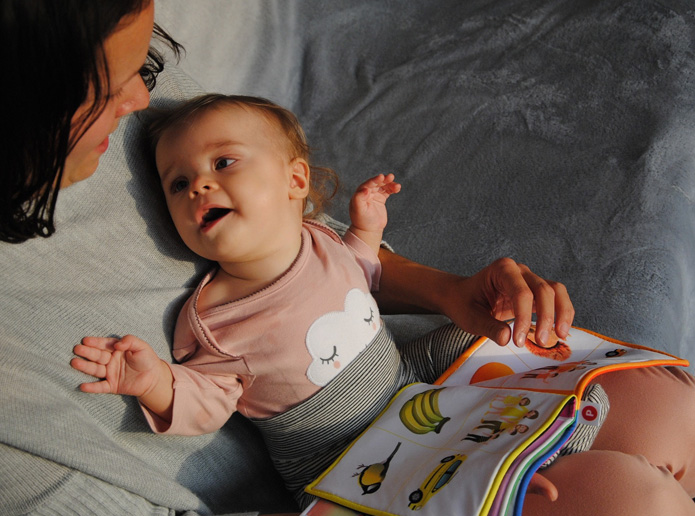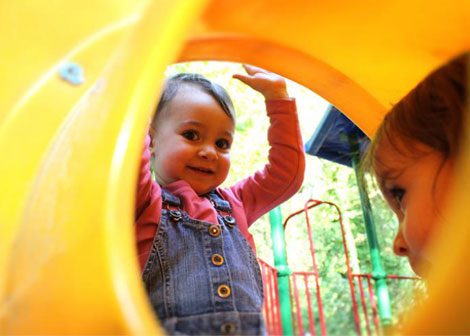Being emotionally present with your baby is how connections are created.
Tips to connect
- Spend gentle, loving time with your baby when they are awake.
- Talk softly and sing to your baby.
- Hold, cuddle and stroke your baby so they learn to be safe and loved.
- Look into your baby’s eyes when you are feeding or holding them.
- Watch and listen so you can learn your baby’s different cries, signals and what they mean.
- Copy some of your baby’s gestures. This shows your baby that you have heard them and you are replying.
- Talk to your baby as you do things together let them know what you are going to do next.
- Say the same words every time, e.g. “I am going to pick you up now,” or “Here we go.”
- Your baby won’t understand your words at first but they will learn from the tone of your voice and sounds.
Helping your other child tune into your baby
Be honest and let your other child know that the new baby won’t be able to be a playmate for a long time. Explain that the baby will cry a lot and not to worry, this is baby’s way of letting us know what he needs. Explain that the baby may wake through the night for a feed.
Your first child may have a range of emotions, from excitement to jealousy or even resentment. This is perfectly normal. Your first child’s age and temperament will also play a part in how easily he adapts to sharing his or her space.
Younger toddlers are not able to talk about their feelings, and they may go back to behaving like a baby (regression). Be ready for extra tantrums, acting out or clinginess. Even if you have done all you can to help your child to adjust, they may still feel left out and upset.
Language
“I know you feel upset when I am feeding the baby and you want to play. I like playing with you too.”
It’s common for a toddler to sometimes ‘over-love’ the baby. They may hug too tight or kiss the baby too hard. This shows their confusion and the love-hate feelings they may have for the baby. Show them how to be gentle.
Children of different ages
Parents might see different behaviours from other children, brothers or sisters when there is a new baby in the house. The behaviours could depend on their age. Encourage them to share their experiences and feelings.
Regression
Regression behaviours may include wanting a bottle or dummy or to be carried or dressed by you. Parents should encourage and praise their children for being good but ignore regression.
Hitting
If a child hits the baby, they should be removed from the situation and told that you are very cross and that “we don’t hit”. Don’t let them hit you either. The lesson is to teach them that hitting is not how to show angry feelings.
Predictability
Keep a child’s routine as much as possible as children feel more secure when they know the order of things.
Respecting and valuing
Give children special time and attention, perhaps when the baby is asleep. Read or play together every day if you can.
Give some special big kid privileges such as staying up an extra 10 minutes. Stress that the baby isn’t lucky enough to have these privileges, e.g. “You can go to the cinema with daddy now because you are a big girl but the baby can’t.”
Encourage friends and family to show affection to your older child as well as to the baby.
Parents should explain to an older child that even if they are busy with the baby the child can always let you know if they want attention.
Mention you may not always be able to stop what you are doing, but will spend time with them as soon as you can. If you give reassurance, they may become less demanding.
Try and involve them as much as possible when you are responding to the baby. They like to be part of the action. Praise them for being helpful.
Want to know more?
Raising Children Network – Talking to your baby
Raising Children Network – Reading baby body language





